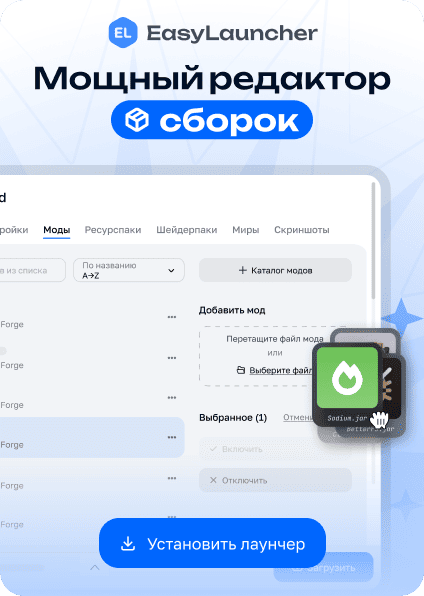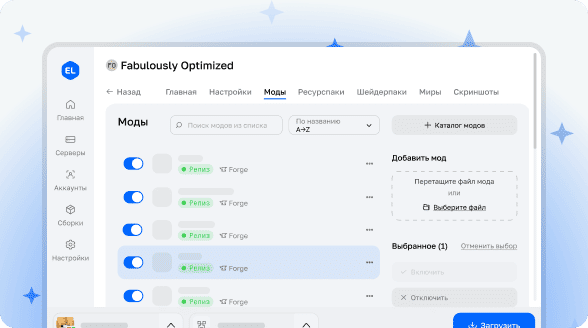
Rift
Rift is a lightweight API for Minecraft modification, library, and mod loader for version 1.13. The main goal of this project is to create a more modular and lightweight platform for game modification. Rift does not aim to compete with Forge or replace it—instead, it offers an alternative approach together with a set of additional library mods created by the community.
Why Another Mod API?
Lightweight and Modular Approach
The main task of Rift is to provide an API capable of expanding any aspects of the game while minimally changing the original code and not adding unnecessary dependencies. Instead of a complex event system, Rift uses a simple, fast, and clean interface-based system for extending vanilla Minecraft capabilities.
For modifying standard game behavior, Rift recommends mods to use the Mixin library for adding callbacks or redirects in any vanilla methods, instead of a limited set of predefined hooks.
Rift intentionally does not include complex features like APIs for energy systems, alternative model renderers, or custom block state formats. Such capabilities should be implemented in separate library mods. The main advantage of this approach is that Rift can update faster for new Minecraft versions, and users won't have to install features they don't need. Rift without installed mods will always run as fast, stable, and memory-efficient as the vanilla version of the game.
Integration with Vanilla Gameplay
The Rift API does not provide hooks for changing existing game mechanics. Instead, it offers tools for expanding every aspect of the vanilla game. Rift also encourages mods to integrate more closely with original Minecraft through the use of standard APIs, shared creative mode tabs and settings menus, which reduces the difference between vanilla and modified content for the player.
However, this does not mean that mods for Rift are somehow limited. On the contrary, they can change how the game works even more flexibly than when using only Forge's API, thanks to the use of Mixin—a simple annotation-based system for modifying vanilla code. Mods can embed callbacks of their methods into any point of any vanilla method or replace standard methods or their parts with their own code. Mixin also ensures that multiple mods can work with one method without losing compatibility.
Compatibility Between Minecraft Versions
With Rift, your mods will work across many Minecraft versions. Through additional compatibility modules, Rift remaps mods to updated obfuscated names and returns unimplemented vanilla methods back to classes, making the unstable Minecraft API stable. Although full compatibility of all mods across many versions may be impossible, most mods should work in at least several versions.
High Performance and Efficiency
Regardless of whether Rift is installed as a Forge mod or standalone, it does not slow down the game's loading time. Since Rift is based on interfaces rather than an event bus, it does not load additional libraries, event callbacks execute extremely quickly, and adding your own mod event requires only a few lines of code.
Recommended Libraries
Unlike Forge, Rift's goal is to make modification more modular. Rift itself provides only functions for expanding the vanilla game, while more advanced APIs and capabilities are provided by the community. Here are some solutions for common functions:
- Networking: Rift API, ProtoCharset
- Configuration: Gson (standard library), Configurate, Random Configs, any other libraries
- Support for other languages: Riftlin (Kotlin)
- Energy system APIs: ZeroPoint
- Capabilities: Rift-Capabilities
- Alternative block state format: In development, coming soon
- JSON-based GUIs: In development, coming soon
- Annotation-based riftmod.json generation: Pylon
Main Features
- Simple and extensible interface-based event system (mods can add their own events with just a few lines of code)
- Interfaces for registering items, blocks, tile entities, fluids, enchantments, particle types, potion effects, biomes, entities, tile entity renderers, custom item renderers, complex (non-JSON) recipes, dimensions, world types, and much more
- Simple network API for easily adding both vanilla packets and mod messages
- Tick events called every client or server tick
- Support for both Mixin and other class transformers
- Automatic dependency downloading and extraction
- Partial dependencies on other mods, where some features are enabled only if another mod is present
Installation
Since Forge for version 1.13 is not yet available, the only way to install or update Rift is to run the jar file by double-clicking it. It will copy itself to the .minecraft folder, and a "Rift" profile will appear in the launcher. Add mods for Rift to the ".minecraft/mods" folder, as usual.
Installing Optifine: Add Optifine to the "mods" folder. Rift will recognize and load it.
Installing in MultiMC: Click "Add Instance", "Import from zip" and paste this link in the field: https://media.forgecdn.net/files/2610/746/rift-1.0.4-66.zip
Running a server: Place the Rift jar file in an empty directory and run the command "java -jar Rift.jar --server". Spigot support coming soon.
For mod developers: Information about using Rift | Sample mod (you can freely copy it)


